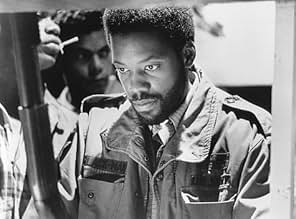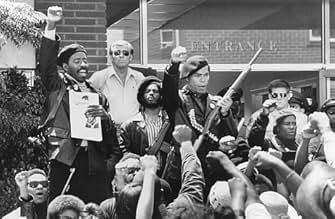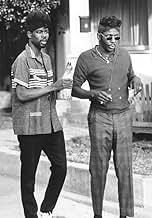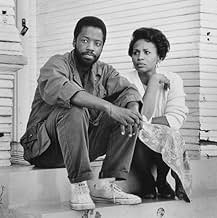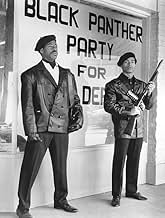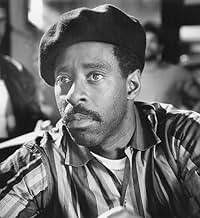AVALIAÇÃO DA IMDb
6,4/10
2,8 mil
SUA AVALIAÇÃO
Adicionar um enredo no seu idiomaA dramatized account of the story of The Black Panther Party of Self-Defense.A dramatized account of the story of The Black Panther Party of Self-Defense.A dramatized account of the story of The Black Panther Party of Self-Defense.
- Direção
- Roteirista
- Artistas
- Prêmios
- 2 vitórias e 2 indicações no total
Avaliações em destaque
1960's inner city America. Tired of non-effective prayer meetings, vigils and pleas to God, a group within the black community decide to take more direct action. Taking the principles of Malcolm X, the group study their rights and begin to bear arms and take a stand against the inequality and the brutality towards their community.
The subject is worthy of a film and is an interesting piece of civil rights history but this film is not the one to do it. The blame for much of this much sadly rest with Peebles in his role as director. If Spike Lee and Denzel Washington could be seen as the black A-list, then Peebles must be very much a C-list star, and his films are often worthy of B or C grades. This is the problem here, the film is not great as a film. It is told in a simplistic, fist raising way that takes away from the impact of it as reality. The focus on Judge's involvement rather than the story of the movement itself, turning the film into more of a action film than one of historical interest.
This is a shame as, even embellished with pro-black slant, the subject would have been interesting. As it is, the fact about whether this was true or not didn't matter to me because I didn't get the impression of history, I got told a story of a man who tries to act as a mole for the group, while some militant group spreads throughout the country. It's a real shame - cause that's not the story I was hoping to be told.
If Peebles is a C-list member, then the rest of the cast comes across like very much a second rate version of Malcolm X. Hardison is a poor comic, never mind requiring him to do a dramatic role. Chong is OK as Huey but he isn't really well served by a film that doesn't pull back well enough and see what the panthers grow to become (and the `finally' bit at the end doesn't cut it). Generally the cast feel like they wouldn't be out of place in a TVM and their performances mostly reflect that. Again, it is a shame but it's hard not to blame the material for their inability to rise above it.
Overall this film was a major letdown for me. I was expecting or hoping for a film that had some historical context and would have the force and impact of Malcolm X. Sadly I was expecting too much from it and this would have been better enjoyed as a thriller that happens to be set in the middle of a Panther cell rather than anything else.
The subject is worthy of a film and is an interesting piece of civil rights history but this film is not the one to do it. The blame for much of this much sadly rest with Peebles in his role as director. If Spike Lee and Denzel Washington could be seen as the black A-list, then Peebles must be very much a C-list star, and his films are often worthy of B or C grades. This is the problem here, the film is not great as a film. It is told in a simplistic, fist raising way that takes away from the impact of it as reality. The focus on Judge's involvement rather than the story of the movement itself, turning the film into more of a action film than one of historical interest.
This is a shame as, even embellished with pro-black slant, the subject would have been interesting. As it is, the fact about whether this was true or not didn't matter to me because I didn't get the impression of history, I got told a story of a man who tries to act as a mole for the group, while some militant group spreads throughout the country. It's a real shame - cause that's not the story I was hoping to be told.
If Peebles is a C-list member, then the rest of the cast comes across like very much a second rate version of Malcolm X. Hardison is a poor comic, never mind requiring him to do a dramatic role. Chong is OK as Huey but he isn't really well served by a film that doesn't pull back well enough and see what the panthers grow to become (and the `finally' bit at the end doesn't cut it). Generally the cast feel like they wouldn't be out of place in a TVM and their performances mostly reflect that. Again, it is a shame but it's hard not to blame the material for their inability to rise above it.
Overall this film was a major letdown for me. I was expecting or hoping for a film that had some historical context and would have the force and impact of Malcolm X. Sadly I was expecting too much from it and this would have been better enjoyed as a thriller that happens to be set in the middle of a Panther cell rather than anything else.
How interesting it is that some of the supporting comments regarding the politics of this movie come from Ireland and England. The comment regarding Patty Hearst, especially intriguing. The error by the poster gives you an idea of how flawed people's perceptions of the Panthers were and still are. Hearst was kidnapped by Sinque, who was purported to be an ex-Panther member.
The Panthers were an interesting phenomena borne from the rough streets of Oakland,California, my hometown. They brought ideals of self-awareness, pride and self-defense. Some say that the theory of J.Edgar Hoover dumping drugs into the black neighborhoods to bring about its downfall was preposterous. As a resident of Oakland, it was absolutely factual that drugs were put into the community to destabilize it. COINTELPRO had insurrectionists cast into the Black Panthers as well as Campus student movements.
The FBI sought the downfall of Martin Luther King, and celebrated on the day of his assassination. Not all parties were in cahoots, but he was thought of as a communist agitator. Funny how no major motion picture of him was done following JFK, isn't it? Some aspects were quite fictitious, the "Judge" character and the shootout in the warehouse as well. The Panthers were considered an enemy to the established order and it was seeded with "inside" people to ferment internal conflict. The film may not be completely historically accurate, but it does portray the need then and now for a Black Panther Movement. The concept of Government conspiracy isn't new; see Operation Mongoose, Operation Northwoods, Watergate, Iran-Contra, etc. this was a flawed, but intriguing film about an organization that sought to improve the conditions of the community. And how the establishment created methods to destabilize and destroy it.
The Panthers were an interesting phenomena borne from the rough streets of Oakland,California, my hometown. They brought ideals of self-awareness, pride and self-defense. Some say that the theory of J.Edgar Hoover dumping drugs into the black neighborhoods to bring about its downfall was preposterous. As a resident of Oakland, it was absolutely factual that drugs were put into the community to destabilize it. COINTELPRO had insurrectionists cast into the Black Panthers as well as Campus student movements.
The FBI sought the downfall of Martin Luther King, and celebrated on the day of his assassination. Not all parties were in cahoots, but he was thought of as a communist agitator. Funny how no major motion picture of him was done following JFK, isn't it? Some aspects were quite fictitious, the "Judge" character and the shootout in the warehouse as well. The Panthers were considered an enemy to the established order and it was seeded with "inside" people to ferment internal conflict. The film may not be completely historically accurate, but it does portray the need then and now for a Black Panther Movement. The concept of Government conspiracy isn't new; see Operation Mongoose, Operation Northwoods, Watergate, Iran-Contra, etc. this was a flawed, but intriguing film about an organization that sought to improve the conditions of the community. And how the establishment created methods to destabilize and destroy it.
Panther's depictions of the Black Panther Party for Self Defense and the opposing white establishment are perhaps a bit simplistic; nevertheless it made the movie no less thrilling.
Mario Van Peebles uses television footage from the civil rights struggles in the 1960s to demonstrate why the Black Panther Party came into existence. The scenes of police brutality and the Party standing up to the police were shot well and enable the viewer to grasp the fear as well as frustration of the times. Whether or not the film portrays an accurate account of history and the reasoning behind the creation of the Party is debatable. Of course, no film is completely historically accurate, and most producers, writers and directors have their own agenda when making a film. However, all that being said, it is not difficult to believe that the 'white' establishment behaved either exactly or near to the way it is depicted in the film. We need only read our history books, newspapers and watch footage (some of which was shown in the film) of the 'white' establishment's appalling actions during that period and indeed for centuries before that to determine that the depictions of overt racism and inhumane treatment dished out by the police and others in the film were not far fetched.
One other fact to consider is that the Panthers were considered an enemy to the established order and therefore the propaganda surrounding the history of the Party depicts them as worse than they actually were. The film, I believe, breaks those negative images down. It goes beyond the headlines of the time and depicts the problems facing black Americans then and indeed to some extent now. Indeed the most impressive aspect of the film is how it portrayed the need for the Black Panther Movement. One finds it difficult to advocate violence; however when one's life is on the line and those who are meant to protect are the perpetrators, then the right to defend oneself is the right of every person. The most powerful message this film sends is that the Panther Party was the result of a need not simply a desire.
The film may not be 'completely historically accurate;' however it does present a different view of the Panther Party and its objectives, one that is long overdue. This film is a must see!
Mario Van Peebles uses television footage from the civil rights struggles in the 1960s to demonstrate why the Black Panther Party came into existence. The scenes of police brutality and the Party standing up to the police were shot well and enable the viewer to grasp the fear as well as frustration of the times. Whether or not the film portrays an accurate account of history and the reasoning behind the creation of the Party is debatable. Of course, no film is completely historically accurate, and most producers, writers and directors have their own agenda when making a film. However, all that being said, it is not difficult to believe that the 'white' establishment behaved either exactly or near to the way it is depicted in the film. We need only read our history books, newspapers and watch footage (some of which was shown in the film) of the 'white' establishment's appalling actions during that period and indeed for centuries before that to determine that the depictions of overt racism and inhumane treatment dished out by the police and others in the film were not far fetched.
One other fact to consider is that the Panthers were considered an enemy to the established order and therefore the propaganda surrounding the history of the Party depicts them as worse than they actually were. The film, I believe, breaks those negative images down. It goes beyond the headlines of the time and depicts the problems facing black Americans then and indeed to some extent now. Indeed the most impressive aspect of the film is how it portrayed the need for the Black Panther Movement. One finds it difficult to advocate violence; however when one's life is on the line and those who are meant to protect are the perpetrators, then the right to defend oneself is the right of every person. The most powerful message this film sends is that the Panther Party was the result of a need not simply a desire.
The film may not be 'completely historically accurate;' however it does present a different view of the Panther Party and its objectives, one that is long overdue. This film is a must see!
'Panther' is a superb movie, Exposing the Black Panther Party for what it was before Eldridge Clever took over. It is disturbing, with a lot of blood and swearing, but it tells (most of) the truth, the side no one wants to listen to, that no one wants to believe. Marcus Chong's portrayal of Huey P. Newton is the best part, showing the Revolutionary in a light people never see. Marcus Chong made him a person that people can identify with, carrying his immortality to our modern world. Bravo.
5emm
Very little can be told about PANTHER, which amazingly didn't capture the attention of so many. Based on the past turbulent history of 1967-68, it shows off its mean-spiritedness and hatred on the screen. It's a disturbing account involving brutal, racial violence during the era, and a story of the Black Panthers Party who finds truth for justice. There is just one small point of huge proof: an average "blaction" movie that's made as simple-minded entertainment. A far better directing job would have made it stand out with its head held high over the surface.
Você sabia?
- Erros de gravaçãoWhen Detective Brimmer is chasing Judge, he makes a radio call saying the he is running east on Market Street, in Oakland, CA. Market Street in Oakland, runs South to North. There is no way to run East on Market Street.
- Citações
Bobby Seale: We not anti-white, we anti-oppression! You can't fight racism with racism.
- ConexõesFeatured in Various Artists: Freedom (1995)
- Trilhas sonorasI Got You (I Feel Good)
Written and performed by James Brown
Principais escolhas
Faça login para avaliar e ver a lista de recomendações personalizadas
- How long is Panther?Fornecido pela Alexa
Detalhes
Bilheteria
- Faturamento bruto nos EUA e Canadá
- US$ 6.834.525
- Fim de semana de estreia nos EUA e Canadá
- US$ 2.354.847
- 7 de mai. de 1995
- Faturamento bruto mundial
- US$ 6.834.525
- Tempo de duração
- 2 h 4 min(124 min)
- Cor
- Mixagem de som
- Proporção
- 1.85 : 1
Contribua para esta página
Sugerir uma alteração ou adicionar conteúdo ausente


